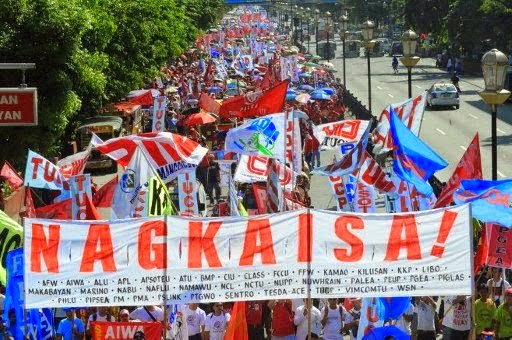 |
| LABOR SECTOR. Filipino cannery workers process sardines in Zamboanga City on February 25, 2009. File photo by Therence Koh/AFP |
MANILA, Philippines – The Federation of Free Workers (FFW) warned that a shorter workweek, as proposed in a measure filed at the House of Representatives, could affect the health and productivity of workers.
Under House Bill 5068, companies would be allowed to implement a 4- to 5-day workweek, instead of the current maximum of 6 days required by the Labor Code.
But the FFW said this might lead to the standard 8-hour workday becoming 12 hours.
"Working for more than 8 hours, although tolerable for a day or two, would not be good for workers' health in the long run. Working 12 hours a day for 4 straight days a week will take a toll on the body," said the FFW in a statement on Thursday, May 18.
"This is dangerous to the health and occupational safety of workers and run contrary to the International Labor Organization (ILO) Convention No. 1 on the 8-hour industrial convention of 1919," the group added.
The convention limits the number of work hours in the industrial sectors to 8 hours a day or 48 hours in a week. This covers mines, factories, and other manufacturing firms.
A report by the Philippine Statistics Authority (PSA) found that there were 8.105 million overworked Filipinos in their primary job in 2015. The number is greater for Filipinos overworked in all of their jobs at 8.845 million.
Senator Grace Poe filed a resolution in March calling for a review of existing policies on the required work hours of companies. She said studies have linked excessive work hours to serious health problems that cause death.
"Chronic overworking, as various research suggest, can lead to threatening levels of stress," the senator had said.
Work-life balance
Meanwhile, the Department of Labor and Employment (DOLE) and the Trade Union Congress of the Philippines (TUCP) expressed support for the proposal.
"Once it is approved, it will provide work-life balance. Workers and employees can spend more quality time with family necessary to become more productive at work, reduce work-related stress and fatigue, minimize transportation cost, reduce workplace electricity expenses, and help decongest traffic," said the TUCP.
But they said there should be proper consultation with workers before implementing a shorter workweek, in case the bill is passed into law.
DOLE Undersecretary for Human Capital Development and Regional Operations Bernard Olalia said the measure should ensure that daily wage earners would receive the same compensation. He added that occupational safety and health standards should still be followed for overtime work.
The FFW also said: "Daily wage rate is pegged at 8 hours. Any work longer than that should be paid with overtime premium."
The minimum wage in Metro Manila is currently P491 per day. Compressing the workweek could lead to a reduction in income if adjustments won't be accommodated.
The labor sector has been calling for a wage increase since the regional standard wage is at least P100 less than the real value of their wages.
The PSA estimates that a monthly income of P9,060 – equivalent to P453 a day in a 5-day workweek – is needed by a family of 5 to meet their needs. – Patty Pasion @pattypasion Rappler.com



